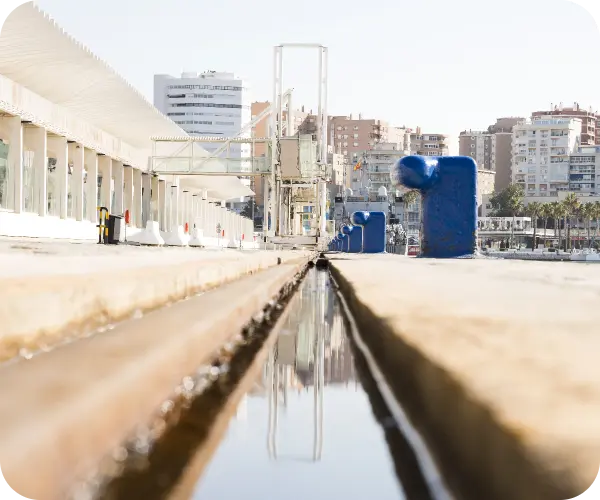Water & waste industry
- Home
- Customer solutions
- Water & waste industry

Compliance with
stringent regulations
Municipal wastewater treatment faces several challenges: managing sludge with high moisture content, controlling odors emitted from the process, and handling the large volume of waste generated. Sludge with high moisture content makes transportation and disposal costly, while odors can impact nearby residents’ quality of life and environmental conditions. Additionally, the sheer volume of sludge strains storage capacities and imposes financial burdens on disposal efforts. Compliance with stringent environmental regulations for sludge disposal is crucial. Adhering to regulations ensures environmental responsibility and avoids penalties, emphasizing the need for effective waste management strategies in wastewater treatment.
Our impact
-
Moisture reduction
Our technology efficiently transforms high-moisture wastewater sludge into dry pellets, reducing volume and mass by up to 80%. This not only makes transportation and storage more cost-effective but also facilitates easier handling and disposal. -
Odor reduction
After moisture reduction, our process forms a hard shell around the pellets, effectively minimizing odor emissions during handling and transportation and ensuring a more pleasant environment for nearby communities. -
Resource recovery
Our process not only reduces the volume of waste but also converts it into a valuable resource. The resulting pellets can be used as a sustainable fuel source or as a nutrient-rich fertilizer for agricultural purposes, promoting circular economy principles. -
Environmental sustainability
By converting wastewater sludge into usable pellets, we contribute to environmental sustainability by reducing reliance on traditional disposal methods such as landfilling. Our approach aligns with the goals of municipalities to minimize waste generation and promote resource recovery.
Pelleton Renewable’s first full scale plant at the Luggage Point Resource Recovery Center, conducted with Urban Utilities from 2019 to 2021, showcased our innovative technology for pelletizing and drying anaerobically digested wastewater solids. The project aimed to cut costs and enhance the sustainability of biosolid management by transforming them into valuable resources to be used as either fertilizer or as a fuel source.
After necessary initial adjustments through R&D, the project provided key insights into maintaining processing rates and integrating our technology with existing operations. The outcomes confirmed our ability to consistently produce safe and effective pellets, substantially reducing the carbon footprint of biosolid disposal. This project not only demonstrated Pelleton’s commitment to sustainable waste management but also indicated significant potential for future applications in the wastewater industry, offering crucial data to improve our technology for future deployments.


